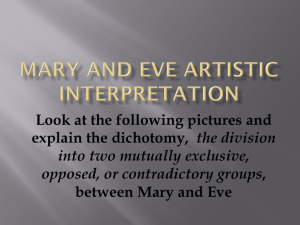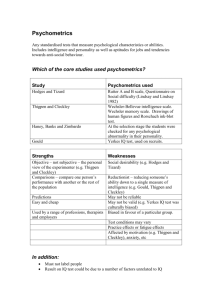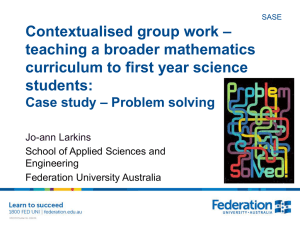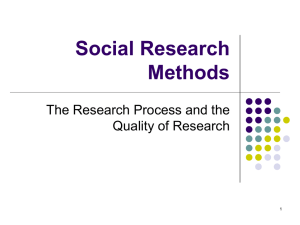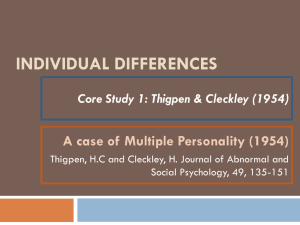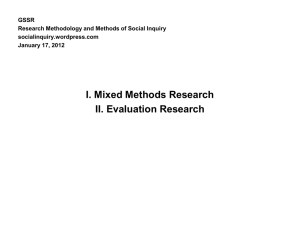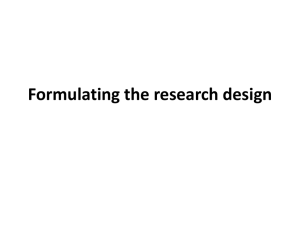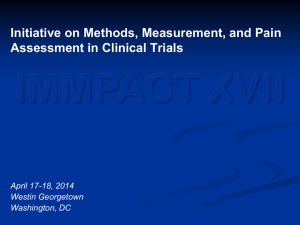Thigpen and Cleckely Evaluation Slides
advertisement
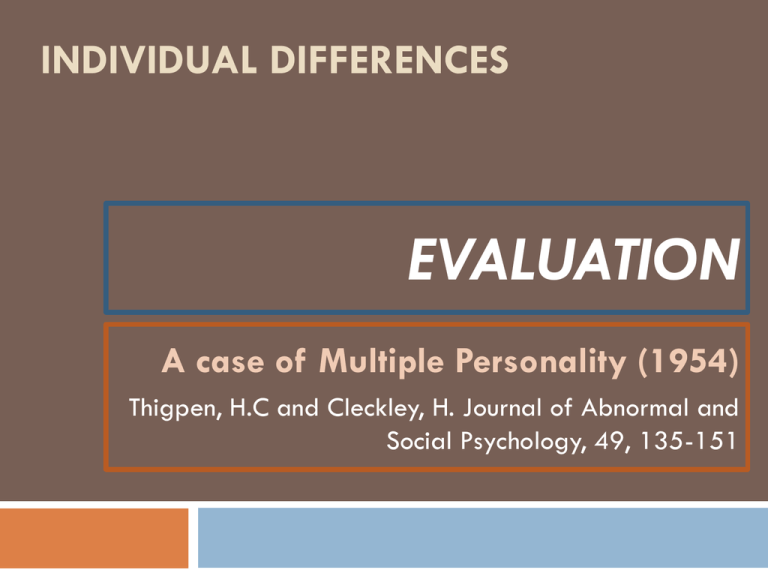
INDIVIDUAL DIFFERENCES EVALUATION A case of Multiple Personality (1954) Thigpen, H.C and Cleckley, H. Journal of Abnormal and Social Psychology, 49, 135-151 Content Page Research: 1. Method 2. Sample 3. Data Collection 4. Reliability 5. Validity 6. Debates 7. Issues 8. Suggested Changes SLIDES Why did Thigpen and Cleckley decide that Eve did not have Schizophrenia? 1. Method: Case study What is a case study? Why is this study a case study? 1. Method: Case Study Advantages DisAdvantages Broad Contextualised Case studies are particularly useful in revealing the origins of abnormal behaviour. Through building up a long and detailed case history. Thigpen and Cleckley also involved Eve's relatives to help verify certain recollections, and to add information, and in this way throw light on the case. 1. Method: Longitudinal What is a longitudinal study? Why was this study longitudinal? 1. Method: Longitudinal Broad Advantages DisAdvantages Contextualised Asked independent experts to give a variety of tests including an EEG test, psychometric tests and projective tests. 1. Method: Self-Report What is Self-Report Why is this study Self-Report? 1. Method: Self-Report Broad Advantages DisAdvantages Contextualised 1. Method: Observation What is an observation? Why is this study observational? 1. Method: Observation Broad Advantages DisAdvantages Contextualised 2. Sample How do we define a sample? What is the sample in this study? 2. Sample Broad Strength Limitations Contextualised In depth study, with rich data Study only Eve enabled researchers to build up and detailed and thorough investigation into the causes of MPD. Generalising beyond the research setting As there was only one participant, the results are not representative of a MPD population. Therefore we cannot generalise these findings. 3. Data collection What is data? Why do psychologists need to collect data? 3. Data: Qualitative The data was mainly qualitative data Broad Contextualised Advantages Data from interviews and hypnosis provides in-depth picture producing rich qualitative data (e.g. the interviews and hypnosis). and also lots of quantitative data such as the results from the psychometric tests. DisAdvantages The data couldn’t be put in a chart or analysed so easily Due to the large amount of information collected in interviews it is difficult to reduce the data to provide an explanation for Eves disorder. 3. Data: Quantitative What data was quantitative? Broad Advantages DisAdvantages Contextualised 4. Reliability 1. This refers to whether the findings are consistent over time and within scores 2. 3. Is this the case or was Eve just a skilled actress? What aspects of the study were reliable? How could we make the study more reliable in future? 4. Reliability Are findings consistent over time? Test-retest method: Are findings consistent over scores? Use of more than one rater Use split-half method 5. Validity Validity refers to whether a study is testing what it set out to test Internal Validity External Validity/Ecological 6. Suggested Changes If you were doing the study now are there any changes that you would make and why? 6. Debates a. b. c. d. e. f. Determinism Vs Free Will Reductionism Vs Holism Nature-Nurture Ethnocentrism Psychology as a science The usefulness of Psychological Research 6c. Nature versus nurture Is Eve’s situation a result of nature or nurture? Nature: Nurture: 6d. Ethnocentric bias Diagnosis of MPD is more prevalent in USA than anywhere else. Why do you think this might be? 6f. Individual versus situational approach Is Eve living up to the expectancies of the situation? Are the researchers putting ideas of different personalities in her mind? 6g. Usefulness of the research - What institutions in society would benefit from this information? - Can the study be generalised beyond the research setting? - Is the study robust, scientific, representative? 6g. Usefulness of the research - - - Findings showed support for the origins of MPD being the result of traumatic childhood experiences and therefore increased understanding of both this disorder and the effects of negative physical and emotional experiences. However, both BPS and the Royal College of Physicians warn that therapists can easily encourage false memories of childhood abuse and that the memories of patients with dissociation may be unreliable. Diagnosis has been used successfully as a legal defence, on occasions. However, the used of MPD as a legal defence remains an controversial issue. 7. Issues a. Ethics b. Ecological Validity c. Longitudinal-Snapshot d. Qualitative & Quantitative Data 7a. Ethical Issues What does ethics refer to? Why do we need ethical guidelines for psychological research? • • Protection of participants Withdrawal – Eve Black didn’t want to take part in Thigpen and Cleckley’s investigation but was bribed to if she wanted more time “out”. Consent It is not known if either Eve White or Eve Black gave consent to widely publicize her case study Giving Advice Thigpen and Cleckley’s solution to Eve’s multiple personality disorder was to encourage another character Jane to take over, this might not have been the correct decision. 7a. Ethical issues in this study Contextualised Strength Limitations 7b. Ecological Validity 7c. Longitudinal-Snapshot 7d. Qualitative & Quantitative Data 8. Suggested Changes If you were doing the study now are there any changes that you would make and why? What do you want to improve? (PECC) Why? What? External Validity • More realistic • Improve generalisability How • Ecological > setting, task, method, data, location • Population > size, gender, age, SES, ethnicity Internal Validity More scientific to establish C&E Controls, procedure, data collection Reliability More consistent Easier to replicate • Design features Ethics
